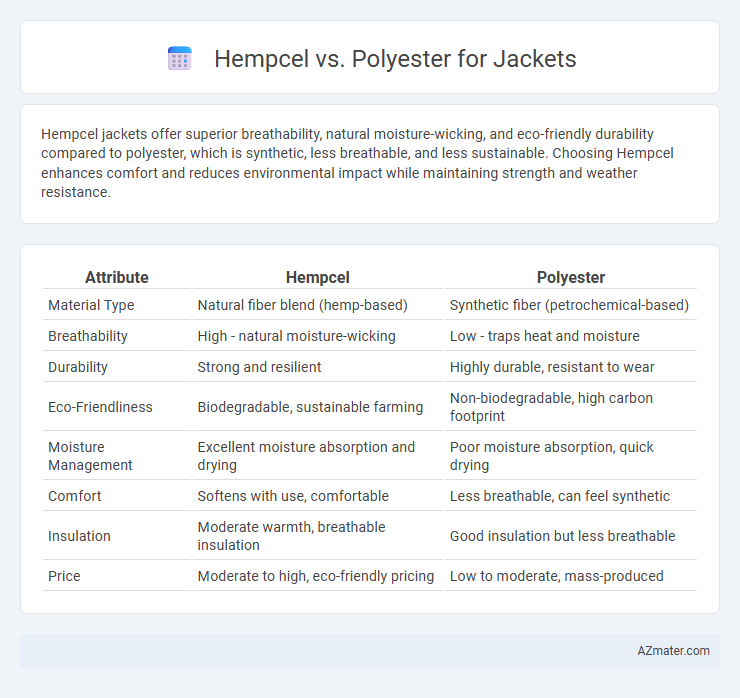Hempcel jackets offer superior breathability, natural moisture-wicking, and eco-friendly durability compared to polyester, which is synthetic, less breathable, and less sustainable. Choosing Hempcel enhances comfort and reduces environmental impact while maintaining strength and weather resistance.
Table of Comparison
| Attribute | Hempcel | Polyester |
|---|---|---|
| Material Type | Natural fiber blend (hemp-based) | Synthetic fiber (petrochemical-based) |
| Breathability | High - natural moisture-wicking | Low - traps heat and moisture |
| Durability | Strong and resilient | Highly durable, resistant to wear |
| Eco-Friendliness | Biodegradable, sustainable farming | Non-biodegradable, high carbon footprint |
| Moisture Management | Excellent moisture absorption and drying | Poor moisture absorption, quick drying |
| Comfort | Softens with use, comfortable | Less breathable, can feel synthetic |
| Insulation | Moderate warmth, breathable insulation | Good insulation but less breathable |
| Price | Moderate to high, eco-friendly pricing | Low to moderate, mass-produced |
Introduction to Hempcel and Polyester in Jacket Manufacturing
Hempcel, a sustainable and biodegradable fabric derived from hemp fibers, is gaining popularity in jacket manufacturing for its breathability, durability, and eco-friendly properties. Polyester, a synthetic fiber made from petroleum-based products, offers water resistance, wrinkle resistance, and affordability, making it a common choice in mass-produced jackets. Comparing Hempcel and Polyester highlights the trade-offs between environmental impact and performance characteristics in outerwear production.
Material Composition: What Sets Hempcel and Polyester Apart
Hempcel jackets are crafted from natural hemp fibers blended with eco-friendly cellulose fibers, resulting in a breathable, biodegradable fabric with excellent moisture-wicking properties. Polyester jackets, made from synthetic polymer fibers derived from petroleum, offer high durability, water resistance, and quick drying but lack biodegradability. The material composition difference establishes Hempcel as a sustainable, environmentally conscious choice, while polyester ranks higher in synthetic performance and cost-efficiency.
Sustainability and Environmental Impact Comparison
Hempcel jackets offer superior sustainability compared to polyester by utilizing hemp fibers, which require significantly less water and pesticides during cultivation, reducing environmental strain. Polyester, derived from petroleum, contributes to carbon emissions and microplastic pollution, making it less eco-friendly in production and disposal phases. Hempcel's biodegradability and carbon sequestration potential position it as an environmentally responsible choice for sustainable outerwear.
Durability and Longevity: Which Jacket Lasts Longer?
Hempcel jackets outperform polyester in durability due to hemp's natural resistance to abrasion, UV rays, and microbial attacks, contributing to longer lifespan under regular wear. Polyester jackets may resist water and stains better initially but tend to degrade quicker with prolonged exposure to heat and friction. Hempcel's robust fiber structure ensures jackets maintain shape and strength for years, making them a sustainable choice for durability and longevity.
Comfort and Breathability: Hempcel vs Polyester
Hempcel fabric offers superior breathability and moisture-wicking properties, making jackets more comfortable in warm and humid conditions compared to polyester. Polyester tends to trap heat and moisture, which can lead to discomfort and reduced ventilation during extended wear. The natural fibers in Hempcel provide enhanced airflow and temperature regulation, ensuring optimal comfort for outdoor and active use.
Moisture-Wicking and Water Resistance Capabilities
Hempcel jackets exhibit superior moisture-wicking properties due to hemp fibers' natural breathability and ability to absorb and release moisture efficiently, keeping the wearer dry and comfortable. Polyester jackets, while inherently hydrophobic and quick-drying, often rely on synthetic treatments or coatings for water resistance but may trap sweat against the skin during intense activity. Water resistance in hempcel is enhanced by its naturally dense fiber structure and eco-friendly treatments, whereas polyester's water resistance depends primarily on chemical finishes that can degrade over time.
Thermal Insulation and Weather Suitability
Hempcel fibers provide superior thermal insulation due to their natural ability to trap air, making jackets warmer and breathable in cold weather. Polyester, being synthetic, offers effective moisture resistance and quick-drying properties, enhancing weather suitability in wet conditions. Hempcel jackets excel in eco-friendly warmth, while polyester jackets perform better in damp or rainy environments.
Style, Texture, and Visual Appeal Differences
Hempcel jackets offer a natural, matte finish with a slightly coarse texture that enhances an earthy, organic style, appealing to environmentally conscious consumers seeking unique, sustainable fashion. Polyester jackets feature a smooth, glossy surface that provides a sleek, modern look with vibrant color retention and wrinkle resistance, making them ideal for activewear and high-performance outerwear. The textured depth of Hempcel contrasts with polyester's uniform appearance, creating distinctly different visual appeals that cater to either rustic charm or polished urban aesthetics.
Price, Availability, and Market Trends
Hempcel jackets are increasingly favored for their sustainability and biodegradability, offering a competitive price point slightly above polyester but justified by eco-friendly benefits. Polyester remains more widely available worldwide due to established manufacturing processes and lower production costs, making it the more affordable choice for mass-market jackets. Market trends show a growing shift towards hemp-based fabrics as consumers prioritize environmental impact, driving increased demand and investment in hemp textile innovation.
Final Verdict: Choosing Between Hempcel and Polyester Jackets
Hempcel jackets offer superior breathability, sustainability, and natural moisture-wicking properties, making them ideal for eco-conscious consumers seeking comfort and durability. Polyester jackets excel in water resistance, lightweight durability, and easy maintenance, appealing to those prioritizing performance in wet conditions and budget-friendly options. The final choice depends on whether the wearer values environmental impact and comfort (Hempcel) or water resistance and low cost (Polyester).

Infographic: Hempcel vs Polyester for Jacket
 azmater.com
azmater.com